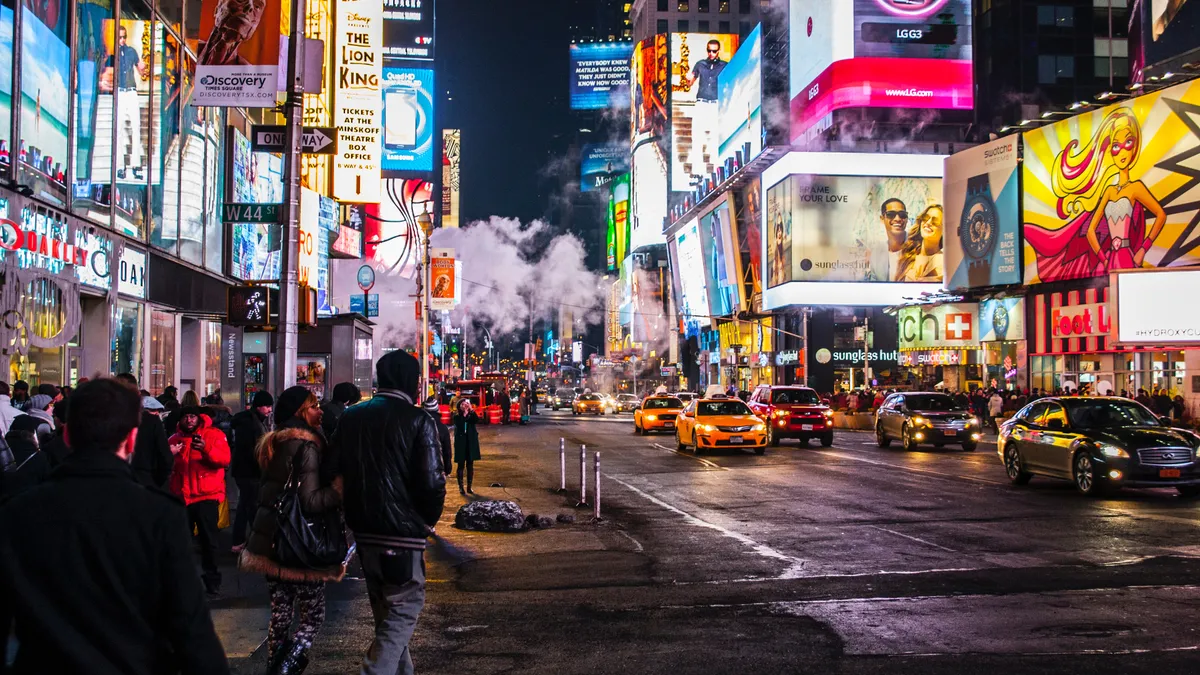For many people in 2020, New York City hasn’t been a destination of choice.
One of the hardest hit areas of the country during the onset of the novel coronavirus in the U.S., the city has seen residents and businesses fleeing to less densely populated, less expensive suburbs.
But take a look at Andrew Pearl’s LinkedIn page, and you’ll see the vice president of San Francisco-based Swinerton, the 18th largest general contractor in the country, in front of his company’s logo imposed on a backdrop of Manhattan, and a meme that says “New York State of Mind.” It’s all part of Pearl’s and Swinerton’s push into New York City at the exact moment that many industry watchers have predicted the demise of urban centers in general, and the office sector in particular.
“New York City is obviously a very competitive market, and penetrating that market is difficult no matter when you do it,” said Pearl. “But there probably are not a lot of people who are willing to take that risk during a pandemic, and in a market recession. Which is why we decided this is our opportunity to really break into New York City.”
While the move drips with the exact type of moxie needed to make it in the Big Apple, it’s also part of a well thought-out, segmented approach to the market. For instance, Pearl says Swinerton will initially focus on corporate interiors, a segment he says is both rife for alteration right now, and a great seeding ground for further expansion, without taking on the risk of new, ground-up construction in the current market.

“It's a controlled risk environment with corporate interiors,” Pearl said. “It's a great place for us to start to cut our teeth and learn the market, build relationships with the trades, and then continue to build our portfolio to eventually get into the vertical construction component.”
That market will likely be composed of many more “hard walled” offices in the COVID-19 era work environment, he said, as opposed to open, collaborative spaces.
Another advantage of targeting corporate interiors is that doing several smaller projects would expose Swinerton to multiple customers in a short period of time.
“You're able to touch a lot of clients because you do a lot of projects every year when you're doing corporate interiors,” Pearl said. “As opposed to doing one large vertical construction project over two years, you might be able to capture 15 or 20 projects in a given year.”
While many in the market have taken a wait-and-see approach to office projects and the future of work during the pandemic, Pearl says more than six months after the outbreak of COVID-19 in the U.S., companies are reaching the limits of what they can do with a virtual workforce.
He points to Facebook’s 730,000-square-foot lease of the entire former post office at Penn Station in Midtown this summer, as well as a still-under-wraps tech client that recently put out an RFP for office space in Times Square.
“They’re bullish on office,” Pearl said. “There really, truly is a significant impact on the productivity and the creativity of organizations that allow people to work in their pajamas while sitting in bed. That's just the reality of it. All the things that make the office what it is, are driving people back towards going to a workplace environment. It gives people a sense of purpose.”
March to 2030
The New York expansion is what Pearl calls Swinerton’s “March to 2030,” the firm’s 15-year business plan to expand both its geographic and sector diversification. As a 132-year-old business founded in Los Angeles in 1888, the firm took on the hard lessons it learned during the Great Recession, and set a laser focus on extending the company’s legacy into the next century, and beyond.
“We had been pretty hard hit in 2008 and 2009 with the Great Recession, and that was primarily because we were kind of a one-trick pony,” Pearl said. “We were primarily focused on commercial office and hospitality, with some sprinklings of health care and a few other things. But largely, we were a commercial contractor focused on three or four markets, and somewhat regionalized on the West Coast.”
Even though the firm had operations in Denver and Austin, Texas, at that point, its focus was still primarily in California, Oregon and Washington. But it had ambitions to go east, and in 2013 launched a joint venture in Atlanta called Cambridge Swinerton Builders. That eventually became Swinerton’s Southeastern Division in 2017, with additional offices in Charlotte, North Carolina, and Nashville, Tennessee. Then last year, the firm further expanded its footprint in Texas with the opening of its Dallas office.
The New York City launch, which is slated for June 2021, is aimed at augmenting that eastward expansion to serve existing clients in Pennsylvania, Maryland, Virginia and Washington, D.C., and target additional opportunities in the Midatlantic and Northeast. It also builds on the leapfrogging the firm has used to move east so far.
“Mergers and acquisitions is not our strong suit,” Pearl said. “The way we’ve found success in expansion is by taking existing leadership, bringing the Swinerton culture with us, and then hiring local talent.”






















